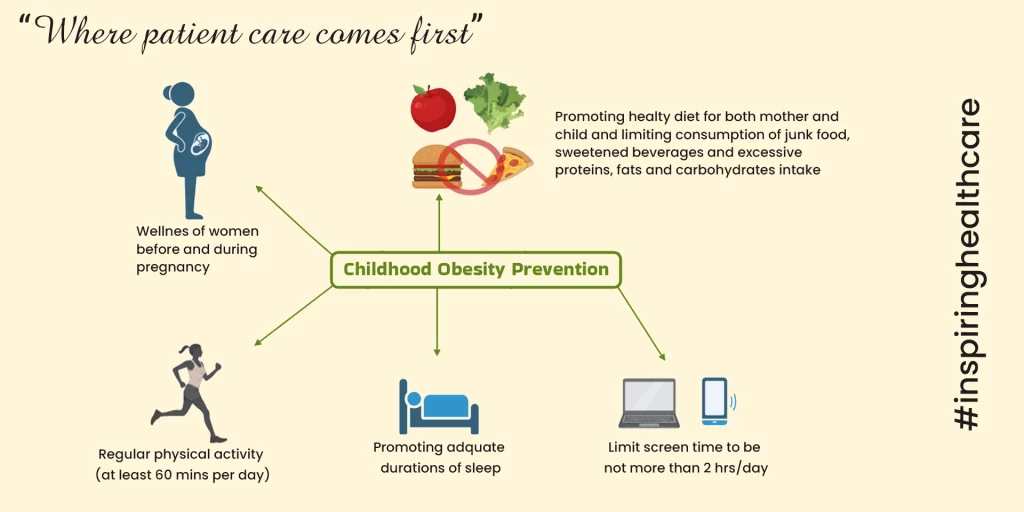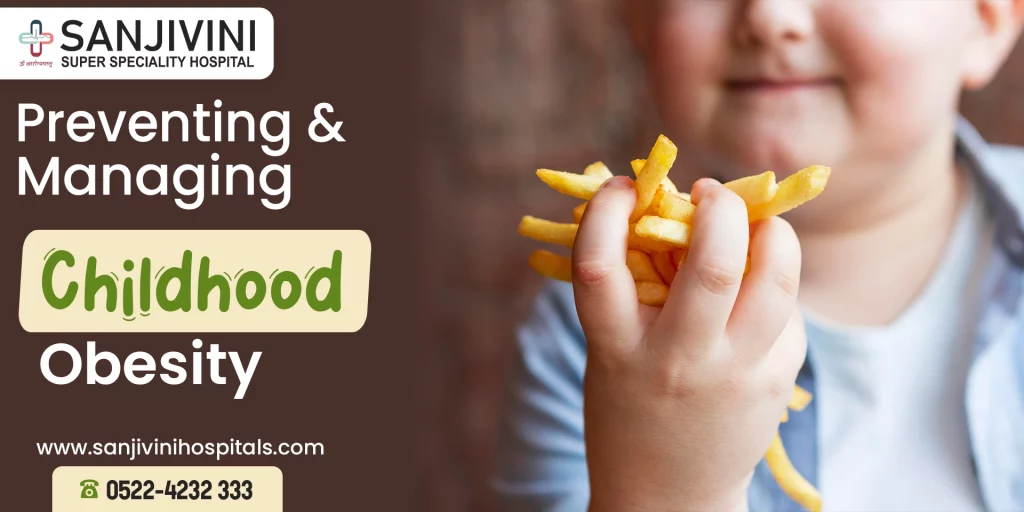Ever noticed how many cool gadgets and yummy snacks surround us nowadays? It’s awesome, right? But there’s something important we need to talk about too – childhood obesity. It’s when kids weigh too much for their age and height, and it’s becoming more common.
But guess what? We’ve got the power to help! This guide is all about stopping childhood obesity before it starts. We’ll learn why it happens and what we can do to keep our kids healthy and happy.
So, buckle up! We’re going on a journey to discover simple tips and tricks to make sure our kids grow up strong and full of energy. Are you ready? Let’s dive in!
Understanding Childhood Obesity
Childhood obesity is a serious medical condition, in which children and adolescents become overweight. Childhood obesity is a big worry, affecting around 19.7% of kids and teens aged 2-19 in India from 2017 to 2020. It can be defined as the weight of the child is higher than the expected weight for their height, with weight exceeding the 85th percentile and obesity surpassing the 95th percentile according to BMI. This problem has been growing worldwide for about fifty years, with roughly 38.2 million kids under 5 being overweight in 2019. It brings along a bunch of health issues like high blood pressure, high cholesterol, diabetes, breathing troubles, and even early signs of heart problems. Plus, it can mess with a kid’s head too.
Different factors play a role in childhood obesity, like behavior, genes, medicines, and the world around us. There are also differences depending on how much money a family has. So, parents, caregivers, doctors, and communities must team up and tackle this issue together. How? By encouraging healthy eating, getting kids moving, and creating supportive environments. Let’s discuss how to prevent obesity in childhood through diet and physical activity.
Childhood obesity prevention through diet
For babies under 12 months, studies indicate that exclusive & on-demand breastfeeding and avoiding overfeeding are crucial in preventing excessive weight gain. Waiting until 6 months to introduce solid foods, encouraging positive interactions with food, like touching and exploring, and recognizing when a baby signals they’re finished eating all help foster self-regulation in infants.
From ages one to four, sticking to a regular meal plan with three meals and two to three snacks centered on fruits and veggies not only ensures proper nutrition for growth but also lays the foundation for lifelong healthy eating habits.
Between 5 and 10 years old, children start making more food choices independently. Stocking up on nutrient-rich options like fruits, veggies, nuts, whole grains, and low-fat dairy instead of high-calorie snacks such as chips and cookies helps kids understand what foods are good for their bodies.
As adolescents aged 11 to 21 become more independent, parents can support healthy eating by continuing to prioritize nutritious foods, promoting family meals, and letting their teens learn about choosing, buying, and preparing meals on their own.
To encourage healthy eating habits, parents can:
- Shop for healthy, nutrient-packed foods, limiting high-calorie snacks and drinks. Opt for fruits and veggies instead of chips and crackers for snacks.
- Try to eat the food together with the family.
- Establish set meal and snack times to prevent constant grazing.
- Find non-food rewards for positive behaviors.
- Make breakfast a daily habit, ideally enjoyed together as a family.
- Promote Non- Consumption of sugar-sweetened beverages
Also Read: Nutrition Tips for Picky Eaters: A Guide for Parents
Childhood obesity prevention through physical activity
Childhood physical activity varies with age. Babies benefit from tummy time, while toddlers thrive on walking, jumping, and running throughout the day. This active play should continue until they start school at age 5.
Once school begins, ensuring at least one hour of daily physical activity becomes crucial. After-school activities or sports often fulfill this requirement.
Parents can promote more physical activity by:
- Organizing enjoyable family outings like hikes, bike rides, walks, and swimming.
- Limiting screen time to two hours or less for children aged 2 and above. For those under 2, avoiding screens entirely is recommended.
- Enrolling children in after-school sports or activities.
Cut back on screen time
Excessive screen time, whether it’s TV or computer use, can lead to obesity. The Indian Academy of Pediatrics (IAP) suggests keeping screen time to two hours or less each day and keeping mobile devices out of bedrooms at bedtime. Dr. S. Pandey points out, “Kids tend to snack while watching TV, and screen time cut into active playtime with friends or on the playground.
Fix The Snooze Time
Getting enough sleep is crucial for preventing obesity, type 2 diabetes, and frequent headaches in children. Erratic bedtime routines can disrupt sleep patterns, leading to weight gain and other health issues. Establishing a consistent sleep schedule helps children fall asleep more easily.
According to experts at the Centers for Disease Control and Prevention:
- Children aged one to six should aim for 11-13 hours of sleep daily, including naps.
- Kids aged six to 12 need nine to 12 hours of uninterrupted sleep each night.
- Teenagers aged 13 to 18 should aim for eight to 10 hours of sleep every night.
Also Read: Signs of Learning Disabilities in Kids: What Parents Need to Know
How to treat childhood obesity

For infants to children aged 5 years:
Treating obesity in infants to 5-year-olds requires a different approach than for older children. In children under 2 years old, BMI isn’t a reliable measure. Instead, exceeding the 98th percentile in weight for length indicates potential overweight or obesity.
Restricting calories isn’t recommended for infants to 5-year-olds. Instead, the focus should be on maintaining weight while height increases.
For children aged 6-18 years:
For children aged 6 to 18 with a BMI between the 85th and 94th percentiles, maintaining weight while continuing to grow taller is appropriate.
For those with a BMI at the 95th percentile or higher, gradual weight loss of one to two pounds per month is acceptable. Weight management in this age group should involve the whole family, emphasizing healthy living through balanced meals and plenty of physical activity.
If you have concerns about your child’s development, weight eating habits, or activity seek your consultation at Sanjivini Super Speciality Hospital, Lucknow.

